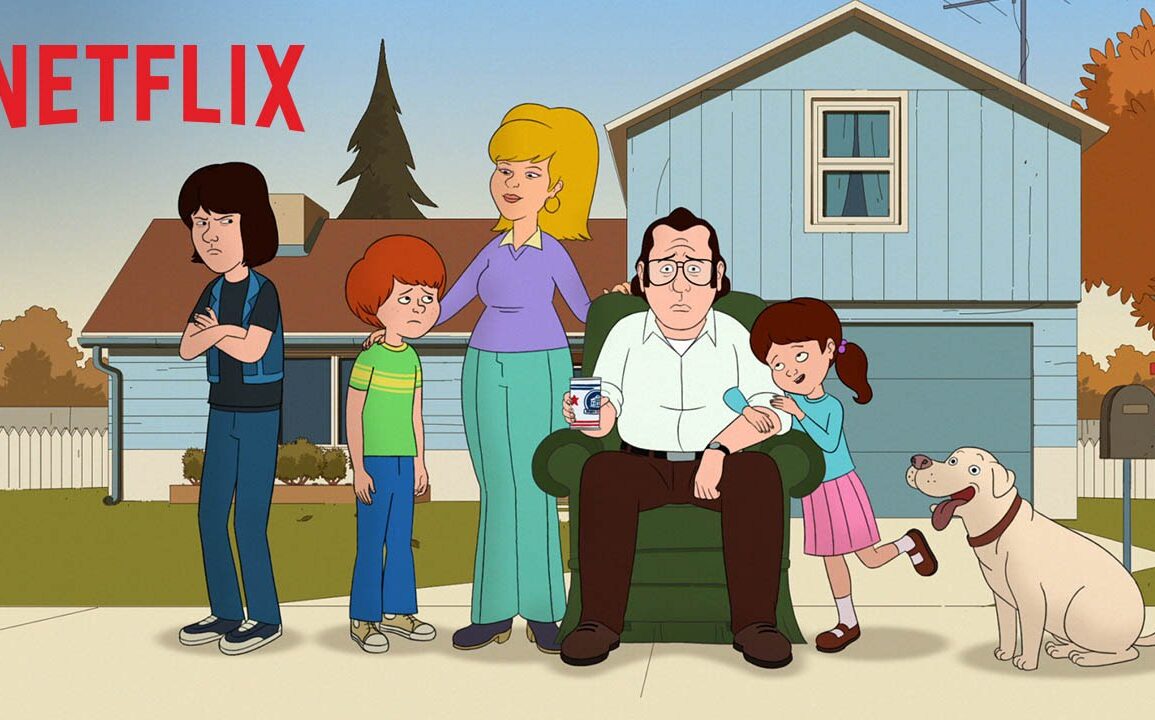Sitcoms have always seemed to create a mark of its own in the macrocosm of television series and now on the various digital platforms such as Netflix.
“F is for Family” is another such sitcoms which effectively portrays the 1970s America, where the status of the women of the time began to revolutionize. Women were expanding their roles to the corporate world. Along with this, the Blacks were also combatting against discrimination with full vigor and different drugs were hitting the market.
The male protagonist of the show is a loud-mouth, typical white American man, with a white collar job at a company named “Mohican Airways”. Frank Murphy is a combination of angry, conceited, vulnerable and at the same time a sensitive personality, who believes in a set of principles of “being the provider of the house”. When his wife Sue, acquires a decent job, he tries to sabotage her only chance to prove his superiority as the “man of the house”.
The female protagonist, Sue Murphy is a compassionate and devoted housewife, who creates a balance amongst the males of the Murphy house. However, she is discontent with her married life, in spite of marrying the love of her life. She aspires to break through the rules of the patriarchal society and desires to have a successful professional career.
The show exhibits the 1970s in a humorous, yet a dark manner. It addresses the issues of time very explicitly and candidly. Several characters and their actions are used effectively to display the blunt realism of the time.
Status of the blacks
 Rosie, a jovial man who works as a baggage handler at Mohican, symbolizes the robust voice of the blacks at the time. In season one he is the character that leads the employees’ strike for higher pay. Furthermore, in season three he also becomes a candidate for the city elections against a powerful white family with generations acquiring the position. This highlights the struggle of black people to become leaders and to gain equality.
Rosie, a jovial man who works as a baggage handler at Mohican, symbolizes the robust voice of the blacks at the time. In season one he is the character that leads the employees’ strike for higher pay. Furthermore, in season three he also becomes a candidate for the city elections against a powerful white family with generations acquiring the position. This highlights the struggle of black people to become leaders and to gain equality.
Patriarchial society
The major female characters of the show are relentlessly trying to break the shackles of the patriarchal society. Maureen, an intellectual, smart mouth, bold girl, also Frank and Sue’s youngest child constantly attempts to compete with the males to gain her father’s attention in a manner which demonstrates her to be more than just his “princess”. She is majorly found hanging around male friends experiencing varied adventures.However, at every opportunity, her smartness and skills are put through trial by the men around her. In season three her teacher believed that Maureen could never ace a test because she is a girl and wrongly accuses her of cheating from a boy in her class. Furthermore, when she participates in a game show and is close to winning, the corrupt producers are not ready to accept a girl’s victory. Maureen’s perpetual efforts to voice her opinions is a quality she gets from her mother, Sue.
Furthermore, when she participates in a game show and is close to winning, the corrupt producers are not ready to accept a girl’s victory. Maureen’s perpetual efforts to voice her opinions is a quality she gets from her mother, Sue.
At the end of the season, one Sue gets a job against Frank’s will. On her job she comes up with a novel gadget called the “salad tosser”, defeating her undeserving, sexist and lewd male bosses.
However, her naivety causes her to be cheated on and she loses credit for the new invention. This leaves her distraught, but also desperate and fervent to make a new invention.
Drug Abuse as a source of happiness
The show also focuses on how people of the time relied on drugs for contentment. Kevin Murphy, Frank and Sue’s eldest smokes weed to escape his dysfunctional family and to craft creative lyrics. Vic, a neighbor of the Murphy’s, who exhibits a glamorous lifestyle is exposed to be dependent on heavy cocaine snorting and pill popping.
The desire to be else
The larger idea of the show is to express how people desperately people wanted to live another’s life.
Frank wants to be a pilot like Chet (a new neighbor in the hood). Sue wanted to be strong and independent like her girlfriend Viv. Maureen wanted to be more than just a “princess”.
Goomer (a neighbor of the Murphys’) craved for Frank’s life to an extent that when is he gets a chance to take care of the Murphy house while the family is on a holiday. He lives in their house, wears Franks’ clothes and pretends to be Frank.
This Netflix original show truly encapsulates the 1970s and constructs an amalgamation of dark emotions, heavy disappointments, and major social outbreaks
It symbolizes how humans always desire for more and are prone to inspecting others just through the visible layer.

